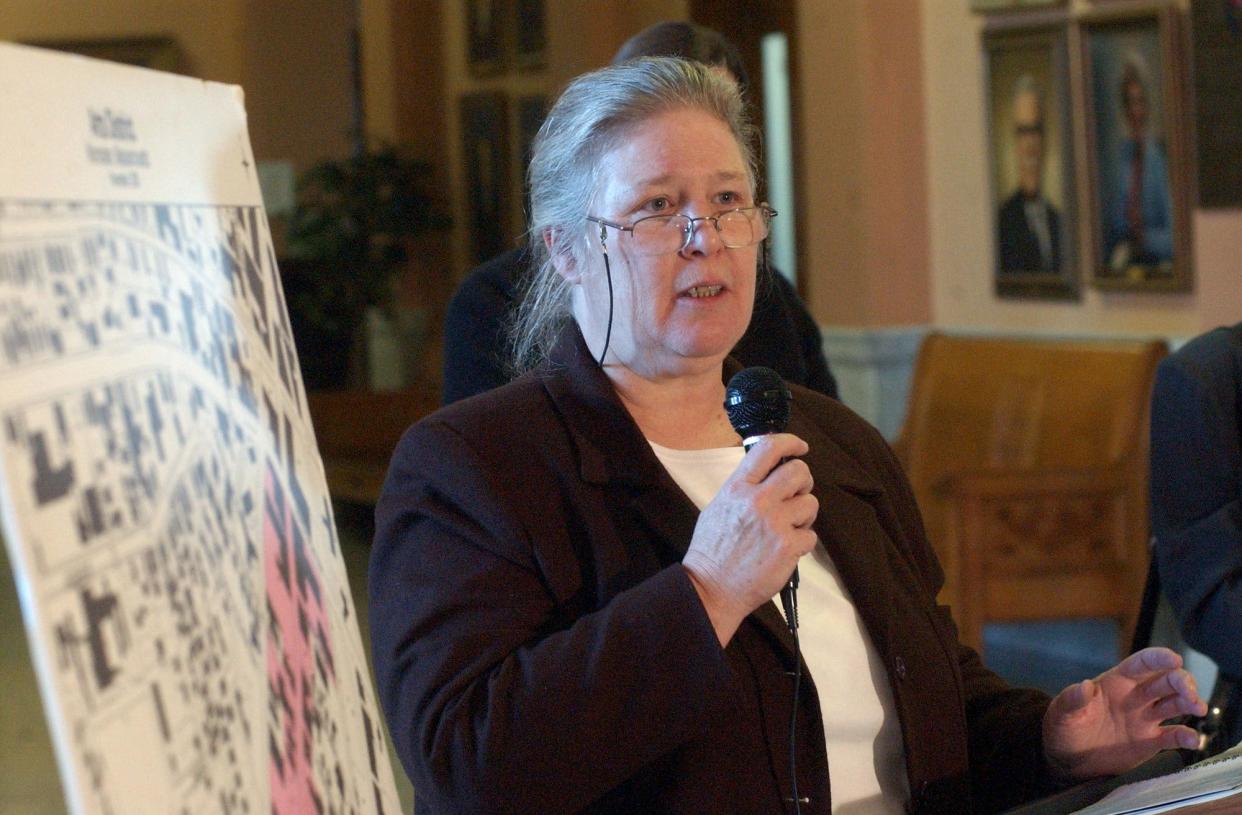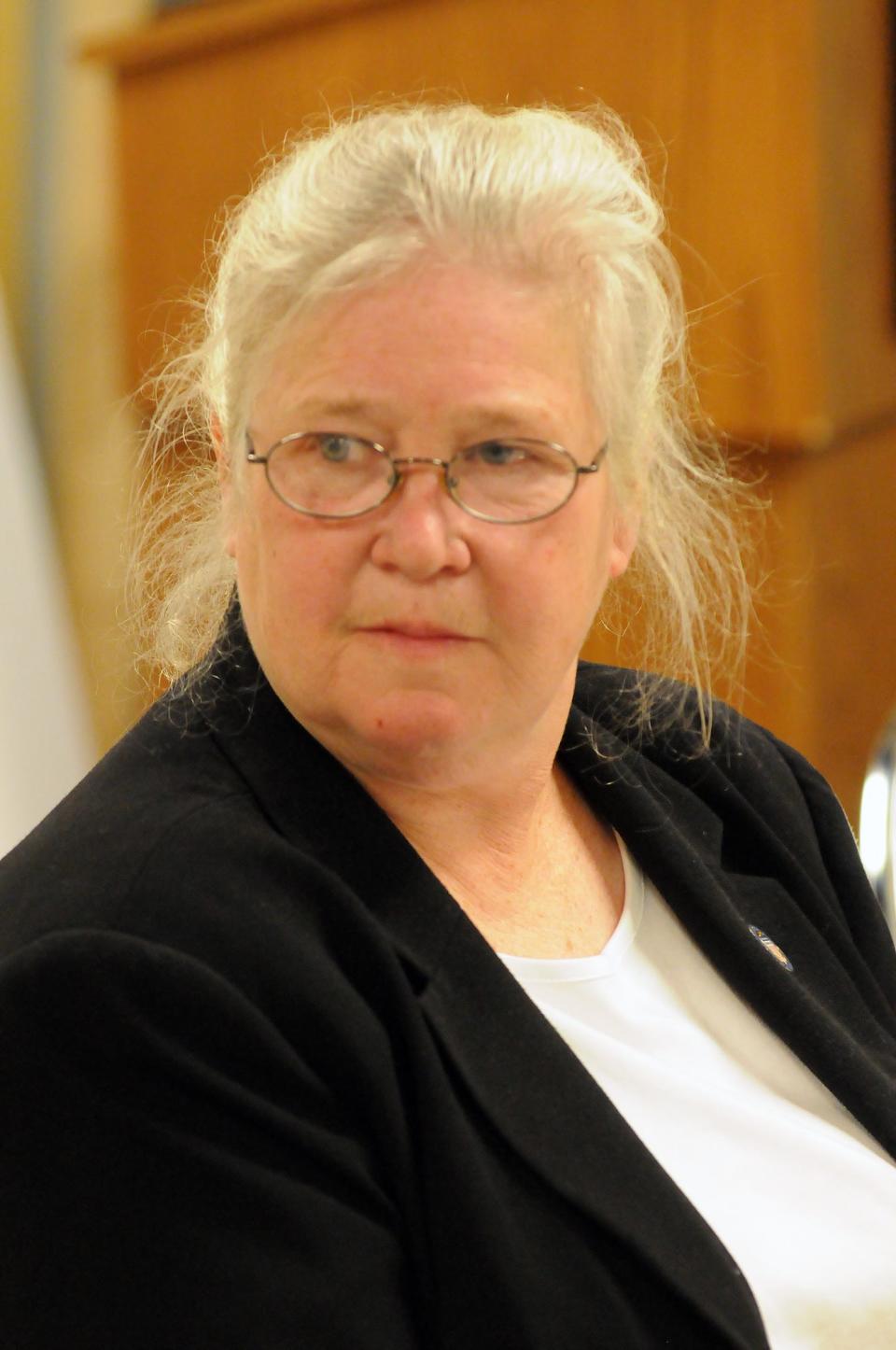Barbara Haller, 73, former Worcester city councilor and advocate for Main South, has died

WORCESTER — Barbara G. Haller, the longtime advocate for and city councilor of Main South, died Monday night amid a cancer diagnosis, family said.
Tributes to the 73-year-old — who remained active in city affairs following her 2012 council exit — poured in Tuesday, with a moment of silence held at the City Council.
“She was a woman in leadership. A stalwart advocate. A fighter," Councilor-At-Large Khrystian King said. "Main South will never be the same."
J. Stephen Teasdale, who has led the Main South Community Development Corp. for three decades, said Haller was truly a "champion" of Main South.
"She wasn’t just somebody who talked about advocacy," he said. "She was someone who was in the trenches, and would get down and do the work."
Haller, who served as District 4 councilor from 2001 to 2011, recently served on the License Commission and had advocated for more equitable housing policies as recently as last week.
Her adult children, Jacob and Charlotte Haller, announced her death on social media Tuesday.
"She didn’t want a funeral or a memorial, no celebrations, but she did want some checks on corporate greed," Charlotte Haller wrote.
In interviews with the Telegram & Gazette Wednesday, Haller's children said their mother died in her kitchen Monday night.
Haller had been ill with metastatic mucosal melanoma since May, Charlotte Haller said. Her death appeared to be sudden, she said, and there were no signs of distress.
“That’s really what she wanted," she said, noting that her mother had struggled with awful pain before treatment at UMass helped her greatly.
Frank Zitomersky, Haller's partner of about 30 years, said she left behind a lengthy to-do list and was still meeting regularly with people about city and neighborhood concerns.
"She was still listening to people — which she did so well — and being a positive force," he said.
Casey Starr, a longtime friend and leader at the Main South Community Development Corp., said she had just met with Haller Saturday to discuss civic concerns.
"She was the most hardworking woman I ever met," Starr said. "There will never be another person like Barbara Haller in our neighborhood, or our city, again."
Winding path
Though she ended up a force in city politics, Haller's path to the City Council — and the city itself — was a winding one.
Born in the suburbs of Schenectady, New York, in 1948, Haller was raised in a large conservative Catholic household.
In a candid interview she gave the Worcester Women's Oral History Project in 2005, Haller said she rejected the "very confined vision" of the world in suburban New York and realized that conformity did not fit her worldview.
A self-described late-1960s "hippie," Haller dropped out of college for social work amidst academic woes in favor of a volunteer gig with Volunteers In Service to America (VISTA) in Chicago.
While there, Haller worked in many neighborhoods suffering from similar issues as she would later see in Main South. It was in Chicago, she said, that she learned about many of the societal strategies for change — urban renewal, for instance — and their pitfalls.
Haller had her daughter Charlotte and bought a large bookstore in Chicago with her former husband, Richard Haller, before leaving the city and helping operate an Arkansas boarding school for at-risk kids.
The couple ended up moving to a Holland home in Richard Haller's family in the 1970s, where, Haller recalled, she decided to go back to college at 30 to help support her family.
Haller chose to get into engineering — a profession men in her family had entered and, she realized, she had subconsciously counted out because of her gender.
"It was an important breakthrough for me," said Haller, who would go on to make equity central in her political career.
After graduating from Worcester Polytechnic Institute — a process her daughter Charlotte recalled as grueling — Haller worked for decades as an engineer at National Grid.
Her political career can be traced to her part ownership of the former Gilrein’s blues bar on Main Street in 1988.
'An oasis'
Gilrein's, which closed in the early 2000s, was a beloved city blues club that showcased a wealth of local talent, in addition to pulling in national acts.
Robin Scott, who partnered with Haller on the venture, and Walter Crockett, the former Worcester Magazine editor and city musician, recalled the club's heyday — and Haller's role in it — fondly Tuesday.
“I daresay there will be musicians all over the state, and beyond, that are mourning now that she’s gone," said Scott, who, along with Crockett, described a warm vibe that Haller fostered inside the club.
Accomplished Worcester guitarist Duke Levine, who played Gilrein's many an evening, confirmed the sentiment Tuesday.
An hour before he was set to take the stage with Bonnie Raitt in California, Levine returned a reporter's call and shared memories of the club and Haller.
"She was always so welcoming — just always happy to see the people, the musicians, happy to have everyone there," he said.
Everything about the club — from the acoustics, to the vibe, to the regular, Doris, that he still recalls — was special, Levine said.
“Especially in that neighborhood, there wasn’t anything like it," he said. "It was just a little oasis."
Levine remembered how, years after the club shut down, but before Haller sold it, she reopened it to host a small show he and some friends were looking to put on.
After an amazing night, he said, Haller gifted him a piano that had long been in the place — and it's still sitting in his basement studio.
"It was so nice of her," he said, adding that he won't be parting with it.
"The legacy will live on," he said. "I'll think of her when I play it."
Politics
Haller became involved in neighborhood revitalization in connection with issues surrounding her club.
Former City Manager Jeff Mulford put her on an advisory board addressing the Beacon-Brightly neighborhood.
Haller ended up running to replace a city councilor who she had supported, Janice Nadeau, winning the District 4 seat in 2001.
Haller told the oral history project while she learned a lot about politics, she never considered herself a politician and was uncomfortable with a lot of it.
"Learning all the protocols and the seniorities and who to get what done and who you
have to mention and how thin skinned people are — it still makes my head spin," she said.
As a non-Worcester native, non-male member of the City Council, Haller considered herself an outsider. Teasdale, the Main South Community Development Corp. leader, said she played that role well and let her convictions be her guide.
"I always considered her to be an advocate who recognized the need to engage in the political process, rather than a politician," he said.
Teasdale and Starr said Haller excelled at listening to people and advocating for what they actually wanted, rather than what others — business interests, etc. — wanted.
"She would always take a position on issues that were reflective of her belief in the need for equity, inclusion and social justice," Teasdale said.
Teasdale said Haller and Zitomersky, who has developed many properties in Main South, have quietly done more good for people in the area than will ever be known.
Zitomersky, he said, has put a lot of money into creating livable spaces for people in need, and has maintained rents that others would not.
"Financial gain has always been secondary to Frank," he said.
Haller served for many years on the board of the Community Development Corp., and, its leaders said, will be irreplaceable.
"She was in many ways the conscience of the CDC," Teasdale said, describing how Haller would always frame policy decisions on how they would impact residents.
Starr said that Haller's ability to listen, and her impact on people in Main South, cannot truly be described.
"She understood the impact of quality-of-life issues better than anyone else, and she cared about them more than anyone else," she said.
Starr recalled how Haller at one point spent days outside a Muslim constituent's house after the woman had been targeted by hate.
"I don't know of another councilor who would do that," she said, marveling at the amount of time Haller dedicated to others.
Starr recalled how Haller often organized get-togethers, including musical ones, at her home, and was always trying to establish a sense of community.
“She singlehandedly changed who I am as a person," she said. "The Main South neighborhood, and myself, will never be the same."
As a city councilor, Haller was known to dedicate 50 hours a week in a mostly hands-on manner. Along with constituent services, Haller helped to plant trees in the neighborhood and eliminate crime and blight.
In 2016, she was appointed to the License Commission.
She was also a leader in the movement to save Notre Dame des Canadiens Church. The group's appeal to block its demolition was rejected by the state Appeals Court in June 2018.
"She fought for what she believed in," said Zitomersky, who also opposed the demolition of the church.
Tributes
Haller served the council until she lost to current District 4 Councilor Sarai Rivera in 2011.
Rivera and other councilors rose to offer tributes to Haller Tuesday.
Candy Mero-Carlson recalled Haller as a "true hero" who always took the side of the residents, while Thu Nguyen read aloud an email Haller sent the council within the last week arguing for affordable housing.
Zitomersky said he's still finding notes of lists Haller kept regarding civic causes she was probing, from her desire to address homelessness to ideas about bridging the gap between police and the community.
Zitomersky said Haller also benefited greatly from palliative care at UMass, and had planned to advocate for its benefits.
He and other loved ones recalled how Haller would hold court on the porch at the couple's home on Castle Street in recent months, including a special get-together in July.
"Some of the musical talents of Worcester came to serenade her," Scott recalled, gathering outside her window and playing songs.
Jacob Haller, also a musician with fond memory's of his mother's club, said the afternoon was extremely meaningful.
He recalled friends coming in one by one to speak with Haller, adding that, in recent months, she had a chance to speak to many of the people she loved.
"She ordered enough food for a small army," Haller recalled, chuckling at his mother's organizational prowess. "It was a real gift."

This article originally appeared on Telegram & Gazette: Barbara Haller, former city councilor and Main South advocate, dies

